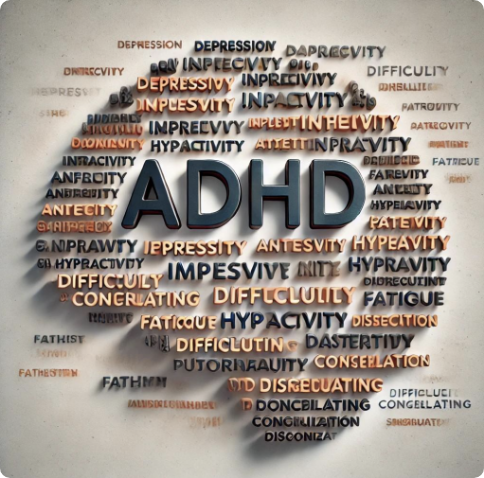Hi, I’m Sébastien, and I help adults and teens with ADHD and depression through a natural, drug-free approach.
Learn 3 ways to get better

Journal it
Writing out your thoughts and feelings every day, or when upset, can help you work through what you’re experiencing and find calm.

Exercise
Daily activity is an excellent way to get rid of feelings of angst and restlessness that feed impulsive behaviours. Aim for 20 minutes a day and do something you enjoy, even a daily walk is enough for major benefits.

Home routine calendar
Keep things simple by building out a chore list that you can follow each week. Use a wall calendar and lots of colours to remind yourself which chores you should be doing on which days.
What to expect
I will provide insights into understanding your condition and offer practical tools for managing it. Throughout, I’ll share my own story and experiences with ADHD and depression and how I overcame them and can support your healing journey one-on-one.
You can learn more about my treatment approach here.
Table of Contents:




ADHD and depression often present unique challenges that can make daily life difficult. Here are three key reasons why you may be struggling with these conditions, highlighting how they impact focus, emotions, and overall well-being.
ADHD (Attention Deficit Hyperactivity Disorder) makes life feel chaotic. Imagine always feeling restless, losing things constantly, and finding it hard to focus. Now add depression to the mix, bringing along sadness and hopelessness. It’s a lot to handle. There are different components at play that contribute to suffering from ADHD symptoms and ultimately depression. Here are 3 key reasons:
Feeling Disconnected
If you have ADHD, you might feel disconnected at times and find it hard to fit in. Your way of functioning is different from others, and sometimes people misunderstand your behaviour as something being wrong with you. But it’s not you—it’s just the rigid system that doesn’t accommodate individual needs. One size fits all simply doesn’t work.
Low Self-Esteem
You may have picked up beliefs from your parents or surroundings that you’re not good enough—not smart enough, not capable enough. Simply because you don’t process information the same way as most others do. These beliefs can reinforce the feeling that something is wrong with you, lowering your self-esteem and draining your energy even more.
Social Anxiety
Feeling different, you likely created a protective bubble as a child to fit in despite ADHD. Perhaps this was at home, where you avoided adding stress to an already overwhelmed parent. You may have developed coping mechanisms to manage your environment. Transitioning to school, being surrounded by a large group of people, could be especially challenging. Adapting to new circumstances and stepping out of your “comfort bubble” can lead to social anxiety and worsen your ADHD symptoms. This can result in later life challenges such as work-related anxiety and depression.

Suffering from ADHD and depression can be different for everyone. Here’s how it felt for me:
Scattered Mind
I couldn’t focus on one task at a time; my mind was always scattered. It was tough to maintain focus, especially for extended periods.
Disorganization
I became reliant on writing down tasks, almost like a project manager, yet I often felt disorganized and frequently lost things like my phone and glasses.
Frequent Mistakes
When I got tired or distracted, I made mistakes easily. My mind would jump between tasks, creating mental noise even during simple activities like cooking.
Busy Head
My head felt constantly busy, filled with thoughts competing for attention. Overthinking was a constant, making it hard to find mental peace.
Up and Downs
Depression and ADHD medications were not good for me. It made me feel upside down, going through very high and very low periods. It left me feeling very unstable.
Symptoms of ADHD-related depression in adults can significantly affect daily functioning and emotional well-being. Recognizing these symptoms is crucial for effective management and treatment, which we will discuss in detail below.
Children and teenagers with ADHD often struggle in school because they learn differently from their peers. The traditional classroom setting doesn’t cater to their needs, leading to feelings of inadequacy and frustration.
They may think:
“Why can’t I understand this?”
“Why am I not intelligent enough?”
This can result in:

A Story from My School Days
I remember excelling in a regular math class to the point where I was advanced to a special class. However, that year, I kept constantly drawing in my notebooks. The teacher asked me to stop and focus on the lessons, and I complied. But once I stopped drawing, my grades plummeted, and I failed the course.
For the teacher, my drawing seemed like a distraction. In reality, it helped me focus on the teacher’s words. Drawing was my way of stopping the noise in my head so I could concentrate on who was speaking in front of me.
Generally, ADHD does not necessarily get worse with age. However, the symptoms can change over time.
In children, ADHD often presents with noticeable hyperactivity and impulsivity. As they grow older, these symptoms might decrease, but challenges related to attention and organization can persist. In adults, ADHD often manifests more in issues with organization, time management, and sustained focus.
It is also possible that individuals with ADHD may face additional challenges as they take on more responsibilities, such as in their careers, relationships, or daily life management.
The progression of symptoms can vary from person to person. Regular follow-ups with a healthcare professional can help manage symptoms effectively throughout life.

It’s a bit like the chicken and the egg—what comes first, ADHD or anxiety anddepression? The truth is, it can go both ways. ADHD can make it hard to fit in or performwell, leading to constant uncertainty and anxiety. You spend a lot of energy trying tofocus, which can leave you feeling exhausted and unable to do anything. This ongoing anxiety can eventually turn into depression by depleting your energy. It’slike a car without fuel—you can’t go anywhere. On the other hand, anxiety anddepression can cause symptoms that look like ADHD, such as poor concentration andrestlessness.
Managing ADHD and depression requires a multifaceted approach that addresses both conditions simultaneously. These strategies can help improve focus, stay organized, and manage emotions, making it easier to enjoy life. We will discuss these tools in detail below.
Task Lists
Create lists to better focus on one task at a time, breaking tasks into manageable steps. Checking them off will also increase your dopamine levels which will improve your motivation and mood
Focus Tools
Use stress balls, fidget cubes, or drawing notebooks to engage the brain and improve concentration. These tools also help increase focus at school or work.
Managing Emotions
Write it Down: Write down your emotions in a journal. This helps to “empty” the emotions, much like taking out the trash. Addressing the root of the problem frees you from lingering negative feelings. Also talking about your emotions helps you process them better and release them.
Understanding the Root Causes
If you’re a parent, it’s important to understand that ADHD often starts in childhood. A common pattern is that one or both parents are stressed, and the child senses this tension. To avoid adding more stress to their parents, children might keep their emotions to themselves and not share their struggles with their symptoms. This means parents often remain unaware of their child’s difficulties until school starts.
When school begins, symptoms become more apparent, manifesting as school anxiety, phobia, or school refusal. The reasons for these issues can vary, including general overwhelm specific academic struggles or bullying. You may be surprised by these challenges since your child didn’t previously share much about their experiences. This is usually when a parent first intervenes, as you want your child to succeed and have a bright future.
Why Parents are Stressed
Life is full of distractions, from constant advertisements to multitasking demands. This scattered focus affects both you and your child, making it hard to concentrate on one thing at a time. By learning to manage your stress and focus, you can teach your child the same skills.
If you’re a parent of a teenager with ADHD—perhaps already developing depressive feelings—the best thing you can do is to lead by example. Your child follows your cues. If you or your partner are constantly stressed, your child will mirror that. It’s crucial to manage your stress levels to help your child manage theirs. When you focus solely on your child without addressing your own needs, it’s hard to make lasting changes. Effective treatment will involve working with both you and your child.

Negative Belief Systems Keeping You Stuck Living with ADHD and depression can make everyday tasks feel overwhelming. You might worry about forgetting things, coming across as rude, or simply feeling exhausted. These struggles can lead to negative beliefs about yourself, such as thinking “I can’t focus,” “I don’t understand,” “I’m not as good as others,” or “I’m simply not good enough.” Over time, these negative thoughts drain your energy and reinforce feelings of hopelessness.
Hypnosis is a powerful tool for changing negative beliefs and improving mental health. It helps you achieve a calm and relaxed state. It’s not mind control like you see in movies— no one is being turned into a chicken. Instead, it’s about cancelling out the noise and distractions, allowing you to be fully present in the moment.
During a hypnosis session, a therapist guides you into deep relaxation and offers positive suggestions to improve your mood, concentration, and overall well-being.
Recent studies show that hypnosis can effectively reduce symptoms of both ADHD and depression by helping bring deep-seated negative beliefs to the surface, making them easier to address and change.
Managing ADHD and depression requires a multifaceted approach that addresses both conditions simultaneously. These strategies can help improve focus, stay organized, and manage emotions, making it easier to enjoy life. We will discuss these tools in detail below.
Promotes Relaxation
Uses calming imagery to help you relax and focus.
Scenario Rehearsal
Allows you to practice and master real-life challenges.
Identifies Negative Thoughts
Uncovers and changes limiting beliefs.
Boosts Self-Esteem
Transforms negative self-talk into positive affirmations.
What we will work on in therapy:



If you don’t believe there is anything wrong with you—how can there be?
BUT…
If you believe that the current version of yourself is true, remember, this is based on a lie. These negative beliefs likely stem from childhood, relationships, school, or work experiences. We will work on creating and believing a new, better narrative about yourself. If you change your thoughts, you change your emotions and your direction will change.

Personal everyday example of Self-Hypnosis
As a Hypnotherapist, I incorporate self-hypnosis into my everyday life. For instance, I was procrastinating on writing an article because I feared it wouldn’t be good enough. How could I sit down, focus, and write something of quality? In the shower, I practiced self- hypnosis, repeatedly telling myself, “I am a good writer; the words come easily to me.”
This self-suggestion reprogrammed my mindset, and within 30 minutes, I wrote two pages. A quick grammar check with ChatGPT, and it was done. Sometimes, all you need to do is tell yourself a better lie until it becomes true.
Overcoming ADHD and depression can be a challenging journey, but recognizing key signs can significantly aid in managing these conditions. Here are three important signs to watch out for as you navigate this path to better mental health.
3 Signs to watch out for - know when to seek help

If you find yourself constantly anxious and worrying, it’s important to know that this isn’t normal. For example, if you’re always aiming for perfection at work or struggling with self-doubt and procrastination, it can drain your energy and leave you feeling overwhelmed.

Feeling persistently drained of energy and lacking motivation can significantly impact your daily life. This might mean struggling to get out of bed in the morning, avoiding social situations, or finding it hard to concentrate on tasks throughout the day.

Constantly feeling the need to prove yourself through overworking or feeling like nothing you do is ever right.
Taking action early can make a big difference in improving how you feel.
Medication-free therapy with hypnosis provides many benefits for those looking for effective treatment without the side effects of medication. Here are six key advantages of using hypnosis to improve mental well-being.

Natural Approach
Hypnosis offers a natural alternative to medication, focusing on harnessing the mind's power for healing.

No Side Effects
Unlike medications, hypnosis does not typically have side effects, making it a safer option for many individuals.

It addresses the root causes of issues rather than just alleviating symptoms, promoting holistic healing.

Hypnosis empowers individuals to take control of their mental health through self-discovery and mindset shifts.

Therapy sessions are tailored to individual needs, providing personalized strategies for overcoming challenges.

By targeting subconscious patterns, hypnosis aims for sustainable changes that endure beyond the therapy session.
Sébastien Léonard is a certified hypnotherapist. After personally struggling with depression, ADHD, and insomnia, he discovered the transformative power of hypnosis and found relief through self-hypnosis. This journey inspired him to become a hypnotherapist and open his own practice to help others. Today, he is passionate about supporting people on their path to wellness.
Hear from clients who have experienced transformative results through our hypnosis and Reiki services. Their stories highlight the personalized care that defines our practice in Laval.
EXCELLENTTrustindex vérifie que la source originale de l'avis est Google. Life changing experience. He really takes the time to understand you. If you put in the work, you can eliminate completely your bad habits and negative thoughts. Thank you Seb, looking forward to see you on our next session.Trustindex vérifie que la source originale de l'avis est Google. Sébastien est un thérapeute qui démontre beaucoup d’empathie et qui est plein d’humanité. Aussitôt que l’on entre dans son cabinet, tout de suite il nous donne confiance et nous met à l’aise. Il exerce sa profession sans aucun jugement et avec beaucoup de professionnalisme. À la fin de la séance, j’ai senti mon esprit plus léger et libéré de mes petits bobos. Et grâce aux enregistrements audio qu’il m’a envoyé, je continue à cheminer. Il est un vrai passionné et un vrai professionnel. Je le recommande fortement.Trustindex vérifie que la source originale de l'avis est Google. Je recommande sans hésitation les services de Hypno-Guide à mon entourage car il est très à l'écoute de nos besoins et adapte son service en conséquence. Les résultats obtenus dépassent toujours mes attentes.Trustindex vérifie que la source originale de l'avis est Google. J'ai bien ma première rencontre. Je repars déjà avec des outils afin de m'aider.Trustindex vérifie que la source originale de l'avis est Google. Par son écoute, son professionnalisme et sa douceur Sébastien m’accompagne vers le mieux-être. Je respire à nouveau. Merci!Trustindex vérifie que la source originale de l'avis est Google. J’ai vécu une très belle séance d’hypnose cet après-midi. Service professionnel, Sébastien m’a aider à cerner ce que j’avais besoin de travailler pour la séance. Tout s’est effectué avec aisance et facilité. La séance a passé tellement vite. J’ai tout de suite ressenti à la fin de la séance, que j’avais libéré des blocages. Je le recommande fortement. J’ai très hâte à ma prochaine séance.Trustindex vérifie que la source originale de l'avis est Google. Les séances que j'ai faites avec Sébastien m'ont fait le plus grand bien et m'ont donné des outils que j'utilise à tous les jours. J'aime son approche et sa sensibilité, il a su me mettre en confiance rapidement.
Frequently Asked Questions
Overcoming ADHD and depression can be a challenging journey, but recognizing key signs can significantly aid in managing these conditions. Here are three important signs to watch out for as you navigate this path to better mental health.
Hypnosis improves focus and impulse control by addressing thought patterns and emotional responses at a subconscious level.
Hypnosis aids in treating depression by altering negative thought patterns and promoting relaxation, which can help alleviate depressive symptoms.
The number of sessions varies by individual and the specific issues being addressed, but many clients start to see positive changes within 3 to 5 sessions.
Hypnosis works on subconscious thought patterns, while Behavioral therapy focuses on changing observable behaviours through reinforcement techniques.
Yes, we offer tailored programs for both adults and teenagers, addressing their unique needs and developmental stages. Each program is designed to suit the specific challenges and goals of the age group.
Book a free consultation call (20 mins) or an appointment with me here.